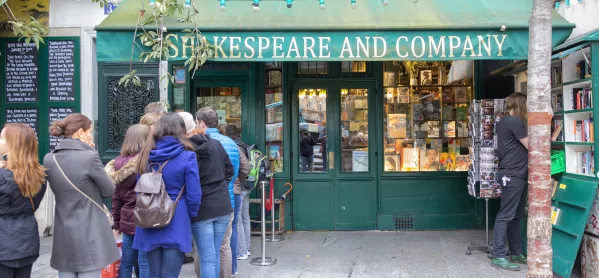- Home
- 10 books about Shakespeare English teachers should read
10 books about Shakespeare English teachers should read

The course of list-making never did run smooth.
A white, male English teacher proposes a list of canonical texts about the bard.
What could go wrong?
Quick read: 3 essentials for teaching Shakespeare at GCSE
Quick listen: Should WhatsApp be used to teach writing?
Want to know more? Don’t be too quick to demolish handwriting
Lists are inevitably contentious. But, agree with me or not, I’m confident that reading these books will definitely get you thinking:
This is Shakespeare by Emma Smith
Erudite, quotable and ludicrously readable, this overview of the author’s favourite plays will assist any teacher looking to develop their subject knowledge.
Key idea: Shakespeare’s writing is deliberately ambiguous, creating characters and situations full of moral complexity.
Shakespeare’s Language by Frank Kermode
Modern Shakespeare scholars tend to focus on theoretical responses to the plays. Yet, in this magisterial work, Kermode concentrates instead on the building blocks of Shakespeare’s plays: his words.
Key idea: Shakespeare’s writing style goes through a momentous transformation around 1600.
1606: The Year of Lear by James Shapiro
Surpassing even 1599: A Year in the Life of William Shakespeare, Shapiro’s gripping chronicle is an absolute must for teachers of King Lear and Macbeth.
Key idea: A background of political and civil strife inspired some of Shakespeare’s finest tragedies.
A Feminist Companion to Shakespeare edited by Dympna Callaghan
This lively and challenging all-female collection guides us through the complex relationship between feminism and Shakespeare.
Key idea: Feminist approaches to the texts are vital in helping us understand our past and future relationships.
Will in the World: How Shakespeare Became Shakespeare by Stephen Greenblatt
Greenblatt’s speculative but scintillating work emphasises the context of Shakespeare’s time, creating a riveting biography from the scant details we know about him.
Key idea: A young man from a provincial town becomes the greatest playwright of them all.
Shakespeare, Race and Colonialism by Ania Loomba
Focusing on race and ‘otherness’, Loomba’s fascinating and nuanced work provides essential context for Othello, The Tempest and Merchant of Venice.
Key idea: Shakespeare’s plays provide the perfect opportunity to interrogate historical and modern views of racial ‘difference’.
Shakespeare’s Words: A Glossary and Language Companion by David and Ben Crystal
An indispensable guide to Shakespeare’s vocabulary with helpful further references to topics ranging from greetings, swearing and Elizabethan clothing.
Key idea: We can avoid modern misunderstandings by placing the words into their original context.
Shakespearean Tragedy by A C Bradley
Arguably the single most influential critical work on Shakespeare, Bradley’s lectures fall into the trap of treating characters as people but nonetheless deepen our understanding of Shakespeare’s great contribution to the genre.
Key idea: Our response to Shakespeare’s tragedies is driven by our imaginative and emotional experiences.
Shakespeare: The Invention of the Human by Harold Bloom
A divisive book. Pompous and patchy or idiosyncratic but inspirational? For me, it’s the latter. Put aside the central premise and revel instead in Bloom’s insight into the plays.
Key idea: Shakespeare wasn’t just an amazing writer; he shaped our understanding of the human personality.
Shakespeare’s Politics: A Contextual Introduction by Robin Headlam Wells
An impressive guide to the significant political issues of Shakespeare’s time. Brilliant on the aggressive masculinity of the late-Elizabethan period, it’s particularly helpful for Romeo and Juliet background.
Key idea: Religious, rather than class divides, were the defining feature of Shakespeare’s day.
Other brilliant Shakespeare texts, including ones I’ve never heard of, are available.
So, let slip the dogs of war and tell me what should or shouldn’t be on the list.
Mark Roberts is an assistant headteacher in the South West of England
Register with Tes and you can read two free articles every month plus you'll have access to our range of award-winning newsletters.
Keep reading with our special offer!
You’ve reached your limit of free articles this month.
- Unlimited access to all Tes magazine content
- Save your favourite articles and gift them to your colleagues
- Exclusive subscriber-only stories
- Over 200,000 archived articles
- Unlimited access to all Tes magazine content
- Save your favourite articles and gift them to your colleagues
- Exclusive subscriber-only stories
- Over 200,000 archived articles



